For many businesses, a customer relationship management (CRM) system is their most-used tool. Along with managing your contacts and their details, a good CRM lets you keep track of all your conversations, automate repetitive tasks, and keep opportunities moving forward.
However, some think a CRM is just for high-performing sales teams, with rooms of reps making calls, firing off emails, and closing deals (typically while drinking dangerous amounts of coffee). Lots of businesses – especially in niche industries like recruitment, bookkeeping, or investment advice – have a different sales process, and the typical sales pipeline doesn’t quite fit.
That doesn’t mean CRM software isn’t valuable to those types of businesses. In fact, it might be even more essential. It just needs to be flexible enough to match your business model. CRMs like Capsule are built to adapt to your needs, without requiring complicated workarounds or technical setup.
In this article, you’ll see how different businesses use Capsule to become more effective and drive more revenue. You’ll also discover how you can tailor Capsule to complement your unique way of working, whatever your industry.
Why flexibility matters in a CRM
Many CRMs and industry-specific tools are rigid, built around assumptions that don’t apply to every business. When your system doesn’t reflect how you actually work, you lose a lot of time trying to adapt the system or your processes. Tasks fall through the cracks, and teams end up having to work twice as hard to manage their data.
If you’re a small business without dedicated tech or operations support, an inflexible CRM can cost you more than you can afford in terms of lost productivity, efficiency, and missed opportunities.
Most niche businesses don’t follow a standard sales process. A recruiter isn't closing deals; they’re placing candidates. A bookkeeper is building long-term relationships, not short-term wins. An investment advisor is balancing compliance, trust, and strategic planning.
What do all these businesses have in common? The need to stay organized and provide a great client experience.
Tailored software fulfills that need and enhances efficiency by fitting into your existing workflows, rather than forcing teams to adapt. A CRM that fits around you is also more likely to be used, encouraging higher user adoption. Greater flexibility promotes better personalization, leading to stronger relationships and giving your business a competitive edge.
That’s where Capsule shines. Its structure is simple but highly adaptable with features including:
These let you tailor Capsule to your workflow without requiring a dedicated IT team, third-party consultants, or any complex setup.
Customizing your CRM for recruitment
Recruitment is a relationship-driven industry, making relationship management software essential. Recruiters often juggle dozens of roles at once, each with its own set of requirements, timelines, and stakeholders.
With high stakes for both clients and candidates, small mistakes can have big consequences. For smaller agencies or solo recruiters, the challenges are amplified. Without dedicated admin support or complex applicant tracking systems, staying organized becomes both a strategic priority and a daily struggle.
Capsule helps recruiters stay on top of every role, every candidate, and every step of the hiring process, offering a complete view of progress and priorities at a glance.
- Use Opportunities to track open roles. Each job can be set up as an Opportunity, complete with a customized Pipeline reflecting your recruitment stages (e.g., Job Brief Received, CV Review, First Interview, Second Interview, Offer Made, Offer Accepted, Hired). You get a clear visual of where each job stands and what you need to do next.
- Add Custom Fields to capture critical info. From salary range and job location to job type and sector, use Custom Fields to record all the relevant information for the role. Recruiters and account managers get all the context they need at a glance, without having to dig through their inbox.
- Use Tracks to guide repeatable steps. Capsule’s Tracks feature lets you create templated workflows for each new role. When a recruiter creates a new Opportunity, a predefined Track can automatically populate the necessary tasks, such as advertising the role, updating the client, shortlisting candidates, and arranging interviews. Tracks remove guesswork and help you follow a consistent process across placements.
- Projects for post-placement follow-up. The recruitment process doesn’t end when a candidate is hired. Use Capsule’s Projects, with its Kanban-style view, to monitor onboarding progress and performance throughout your guarantee period. Projects enable recruiters to maintain strong client relationships after the hire and spot follow-on opportunities.

Customizing your CRM for bookkeeping
Bookkeepers and accountants often manage ongoing services for multiple clients at once, each with their own deadlines, expectations, and preferred way of working. From monthly reconciliations to quarterly VAT submissions and year-end reporting, you can be working on completely different projects from one day to the next.
Many bookkeeping businesses operate as small teams or solo practitioners, so there’s rarely extra time or capacity to manually track everything (especially when every job needs to be done yesterday).
Capsule helps simplify that juggling act by centralizing everything in one place and supporting repeatable, scalable processes tailored to your way of working.
- Use Opportunities for onboarding or quoting. Set up an Opportunity when quoting a new client or offering a new service. Your pipeline could include stages like Discovery Call, Information Received, Quote Sent, and Signed. You can even add multiple pipelines for different service types, helping you tailor the sales process to each service.
- Use Projects to manage service delivery. Projects can track all your work, from routine monthly bookkeeping and VAT returns to one-time advisory or forecasting projects. By keeping all the communication and details in one place, it’s easy to stay organized and quickly find the information you need.
- Use Tags and Custom Fields for segmentation. Whether you want to identify clients by industry, size, software used (like Xero or QuickBooks), or service package level, Capsule helps you stay organized and personalize your communication. You can easily create filtered lists to send custom updates and ensure the right message gets through to the right person.
- Use Calendars and Tasks to track recurring services. Capsule’s built-in Calendar and Task management tools make it simple to stay on top of your responsibilities, whether it’s one-off tasks or ongoing work. You can schedule repeating tasks for services like monthly management accounts, bank reconciliations, or tax filings. With automatic reminders and visibility across your team, you’ll always know who’s doing what and when it’s due.
Customizing your CRM for investment advisory
Investment advisory and other finance firms succeed by building long-term relationships based on trust and transparency. However, maintaining that trust comes with significant challenges. Advisors need to balance personalized client communication, frequent portfolio reviews, and strict regulatory compliance, all while navigating an ever-changing financial landscape.
For smaller firms or independent advisors, these demands can quickly become overwhelming. Without a clear system in place, it’s easy to lose track of what needs to be done.

Capsule gives investment advisors the tools to manage these relationships with care and consistency, helping them deliver a high-touch experience while staying organized and compliant.
- Use Opportunities to reflect the client journey. Investment relationships typically move through several stages, each one vital to a successful outcome. An Opportunity pipeline might include stages like Intro Call, Fact-Find Complete, Proposal Presented, Signed On, and Portfolio Live. Having a structured flow ensures that no step is missed, which is especially important when managing multiple high-value clients at different stages of engagement.
- Use Custom Fields and Tags for financial profiling. Capture key data points like risk tolerance, investment goals, preferred asset classes, investment timelines, or regulatory preferences using Custom Fields. You can also track personal notes, like whether a client prefers ESG investments or needs quarterly reporting for trustees. Everything is organized and accessible from a single view, reducing the risk of overlooking important details.
- Use Projects for ongoing reviews. Investment relationships are long-term by nature, and maintaining trust means consistently delivering value. Set up a Project for each client to track ongoing activities like quarterly portfolio reviews, annual strategy sessions, or financial life events such as retirement planning.
- Use Capsule’s security features for improved privacy. With sensitive client data and regulatory scrutiny always top of mind, Capsule’s security features help firms stay organized without compromising client confidentiality. Email integration, note logging, and secure file storage are handled in one place, so you have a full record of communications and compliance-related activity when you need it.
Want to see how this works in real life? Take a look at how 360 Wealth Management uses Capsule to deliver outstanding service and stay on top of their client workflows.
Tailoring your CRM for other niche industries
No matter what industry you’re in or how your business works, Capsule gives you the tools to build a system that fits around you. The CRM serves as a foundation for streamlining your operations, collaborating with your teams, and consistently getting the best results for your clients.
Best of all, you don’t need coding skills or a tech team to make it happen. Capsule is designed to be simple and intuitive, with built-in guidance and a friendly support team ready to help out if you ever need it.
Here’s a step-by-step guide for how to tailor Capsule for your business.
1. Start with Pipelines and Opportunities
Think about the key stages your clients move through before they actually become clients. For example, a law firm might use stages like Consultation, Conflict Check, Engagement Letter Sent, and Retainer Signed (with the subsequent tasks handled as a project).
Once you’ve got the stages clearly outlined, go into your account settings and select “Sales Pipelines” and then “Add Pipeline”. You can then add each milestone stage, along with a description and the probability of winning the client at this step.
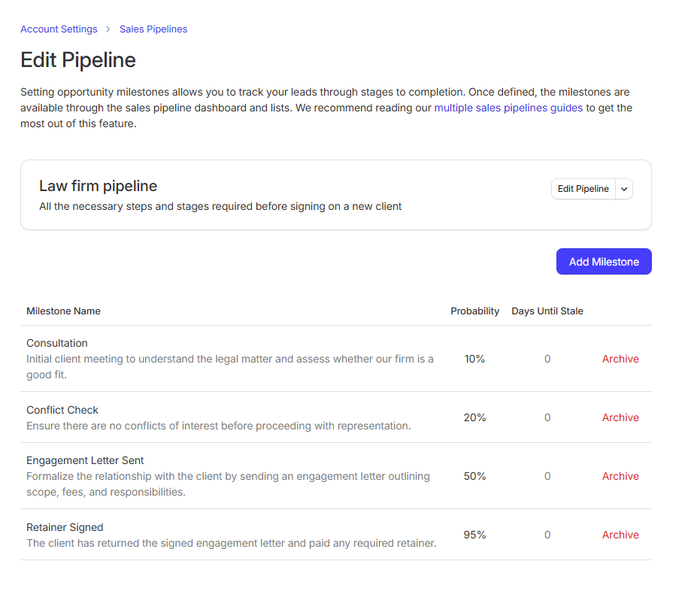
2. Use Custom Fields to store what matters
There are some details every business needs, such as a customer’s name or their contact details. However, there are usually additional details you’ll need to record depending on your unique requirements.
For example, a property manager might track lease end dates, building access codes, or maintenance responsibilities. A coach could log client goals, session frequency, preferred meeting format, or even motivational style.
Capsule’s Custom Fields let you capture these details, whether they’re for people, organizations, opportunities, or projects.
Simply go to your account settings and select “Custom Fields”. You can then choose the field type (text, date, checkbox, link, etc.), label the field and choose what type of record it applies to.
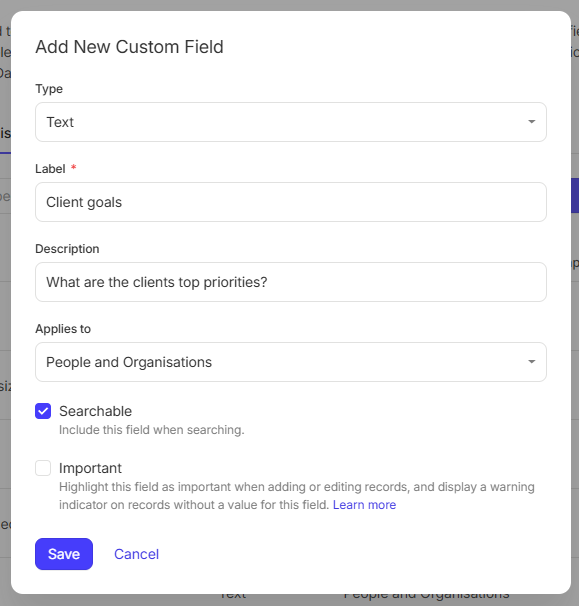
3. Segment contacts with Tags
While Custom Fields are ideal for details that are relatively static, Tags are best for information that’s likely to change. Think of them like digital post-it notes that help you track things on the fly.
A coaching business might tag clients by current program (e.g., 90-Day Accelerator) or status (e.g., Active or Paused). When the program ends or the status changes, just remove or update the tag. An ecommerce consultant might tag leads by interest area, such as Email Marketing, or Product Photography, depending on what they inquired about, handy for targeted follow-ups.
A Tag can also be extended to a DataTag, enabling you to add further details that are relevant to your business.
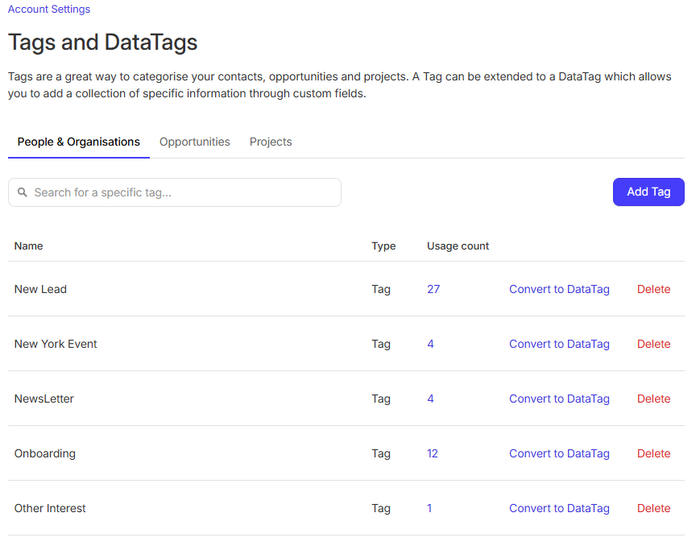
4. Use Tracks for repeatable processes
If your business has workflows that repeat (like onboarding new clients, submitting proposals, or prepping tax returns), Tracks help standardize the process.
For example, a nonprofit could use them to onboard volunteers or manage fundraising campaigns. A freelance consultant might set one up for discovery calls, proposal delivery, and kickoff.
You can set up Tracks for both opportunities and projects (more on those later) through your account settings.
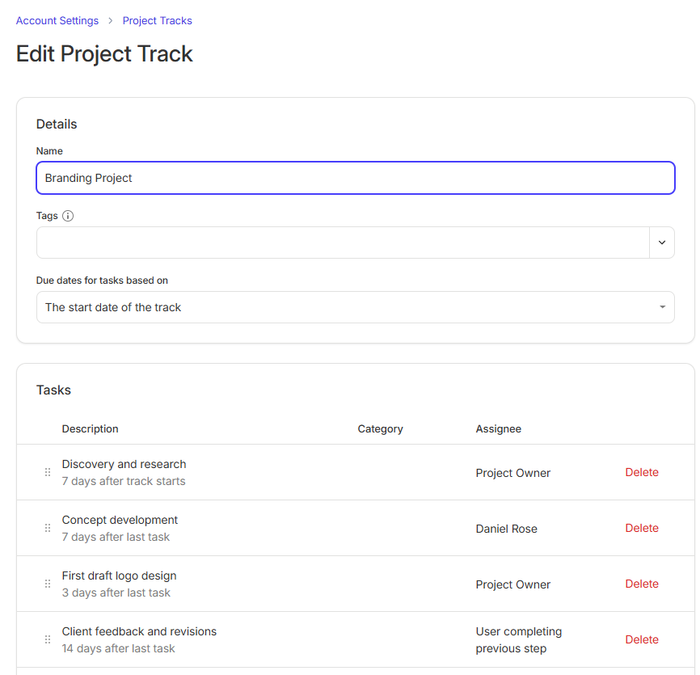
5. Create Projects after you close the deal
Whether you’re managing a long-term campaign, a client portfolio, or a multi-stage renovation, Projects help you group related tasks, notes, and files together and keep delivery on track. You can add collaborators, assign deadlines, and link tasks to broader business goals.
For example, a marketing agency might use Projects to coordinate monthly content plans, while an architect could use them to manage residential builds.
Just like with Pipelines, you can set up Project Boards covering the key stages for your different service types in your account settings. You can then go to the Projects section and add a new project, selecting your newly created board.
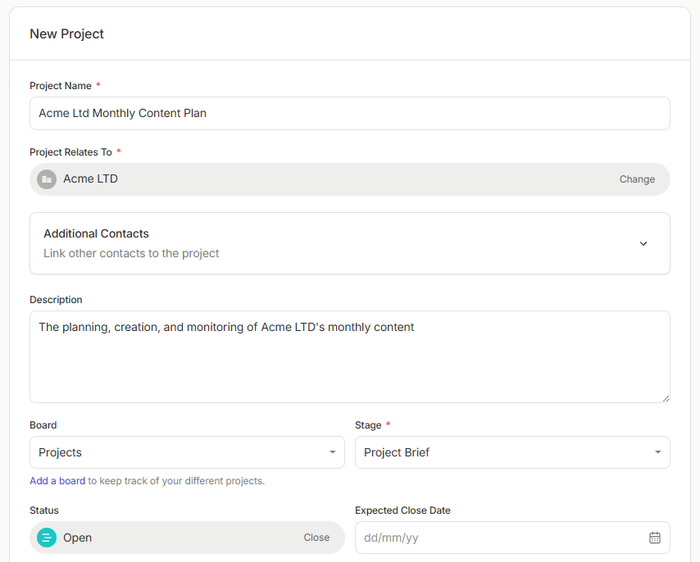
Whatever your business model, Capsule is built to be flexible. You don’t need a developer or a deep learning curve. If you have a clear understanding of your process, Capsule gives you the tools to bring it to life. As your business evolves, Capsule evolves too, so your CRM is always working with you, not against you.
Final thoughts
Every business has its own way of working. The best CRM software doesn’t force you into a predefined mold; it gives you the flexibility to define your own.
Capsule is built for teams who want simplicity without sacrificing customization. Whether you’re placing candidates, balancing books, managing portfolios, or running something totally different, Capsule gives you the tools to stay organized, work smarter, and build stronger client relationships.
Ready to try it for yourself? Try any Capsule plan free for 14 days and discover the power of a CRM that works around you.




